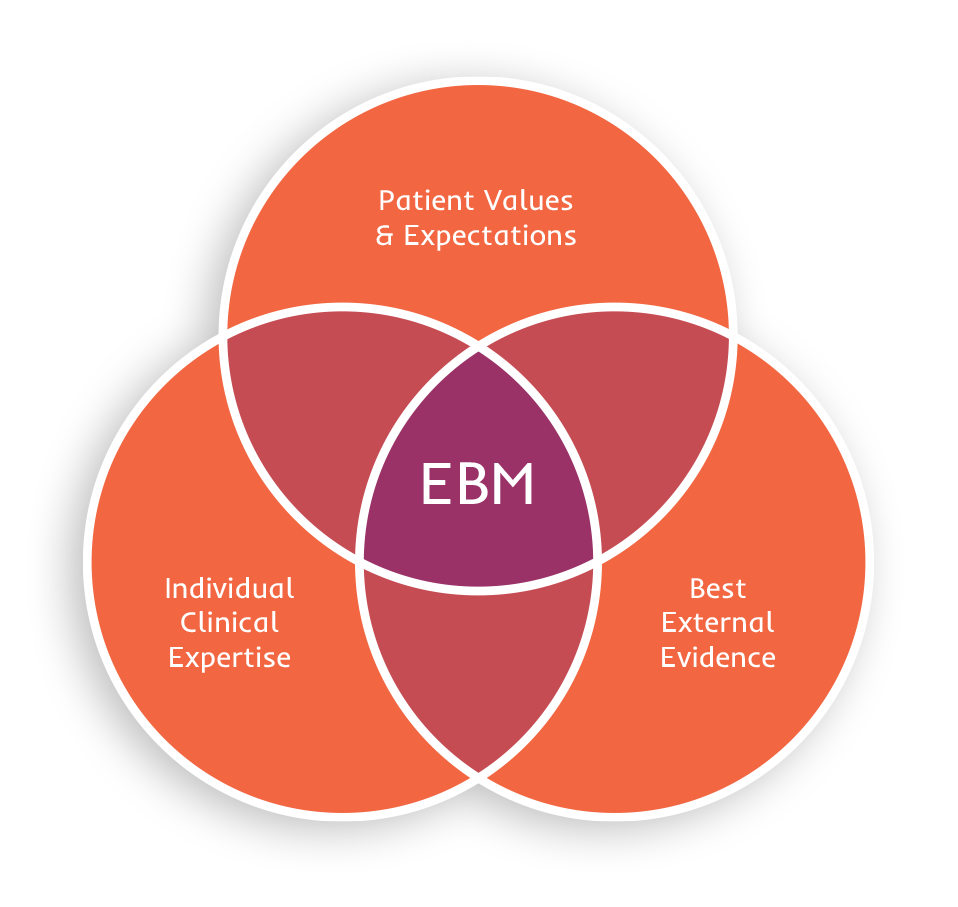
Evidence Based Medicine
Evidence-based medicine (EBM) is the systematic approach of integrating the clinician’s expertise, the best-available research evidence, and the patient’s needs and values into a customized treatment plan. This is known as the EBM Triad (see figure below).
Clinical expertise refers to the clinician’s cumulated experience, education and clinical skills. At The Mind Store our clinicians have over 35 years of combined experience in private and public practice.

Patient Values and Expectations
The open and honest collaboration between clinicians, patients and their families is at the heart of our approach. We honor our patient’s unique preferences, concerns, expectations, environment, culture, and values regarding health and well-being.
Best External Evidence
It is the role of the clinician to review and interpret the best external evidence to develop effective treatments for patients. Links to some of the studies and research data that we refer to on an ongoing basis are listed at the bottom of this page.
Individual Clinical Expertise
At The Mind Store, we put the EBM Triad into practice with every patient we work with. Evidence-based clinical practice ensures that all our patients receive customized treatments that will assist them in achieving their mental health and wellness goals.
Supporting Research
Below are links to some of the research we refer to in developing treatment regimens.
Evidence Based Medicine – New Approaches and Challenges
Masic I., Miokovic M., Muhamedagic B.
Acta Inf. Med. 2008;16:219–225.
Review supporting research.
Adding Psychotherapy To Antidepressant Medication in Depression and Anxiety Disorders: A Meta-Analysis
Cuijpers P, Sijbrandij M, Koole SL, Andersson G, Beekman AT, Reynolds CF. World Psychiatry. 2014 Feb;13(1):56–67.
Review supporting research.
Dialectical Behavior Therapy Skills Training Is Effective Intervention
M.S. Harned and Y. Botanov. Psychiatric Times.
Review supporting research.
The Efficacy of Cognitive Behavioral Therapy: A Review of Meta-analyses
Hofmann, S. G., Asnaani, A., Vonk, I. J., Sawyer, A. T., & Fang, A. (2012). Cognitive therapy and research, 36(5), 427-440.
Review supporting research.
Dialectical Behavior Therapy For Substance Abusers
Dimeff LA, Linehan MM. Addict Sci Clin Pract. 2008;4:39–47. doi: 10.1151/ascp084239.
Review supporting research.
Cognitive Therapy Vs. Medications For Depression: Treatment Outcomes And Neural Mechanisms
DeRubeis RJ, Siegle GJ, Hollon SD. 2008;9:788. doi: 10.1038/nrn2345.
Review supporting research.
What and Who? Mindfulness in the Mental Health Setting
Russell, T. A., & Siegmund, G. (2016). BJPsych bulletin, 40(6), 333-340.
Review supporting research.
A Meta-Analysis of the Efficacy of Acceptance and Commitment Therapy for Clinically Relevant Mental and Physical Health Problems
JG A-Tjak, ML Davis, N Morina, MB Powers, JA Smits, and PM Emmelkamp. Psychother Psychosom. 2015;84(1):30-6.
Review supporting research.
The efficacy of Acceptance and Commitment Therapy: An Updated Systematic Review and Meta-analysis
Ost LG. Behav Res Ther 2014;61:105–21.
Review supporting research.
Nutritional psychiatry: the present state of the evidence.
W. Marx, G. Moseley, M. Berk, and F. Jacka (2017). Proceedings of the Nutrition Society. 76(4):427-436.
Review supporting research.
Nutritional Psychiatry: Where to Next?
Jacka F. N. (2017). EBioMedicine, 17, 24-29.
Review supporting research.
Efficacy and safety of deep transcranial magnetic stimulation
Shalvata Mental Health Center, Tel Aviv University, Hod Hasharon, Israel. World Psychiatry. 2015 Feb;14(1):64-73.
Review supporting research.
Are We Ready for TMS Maintenance?
JOAN A. CAMPRODON, M.D., Ph.D., M.P.H.
Review supporting research.

